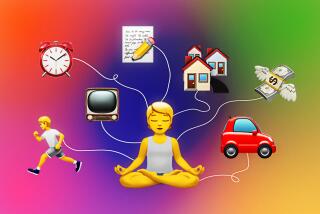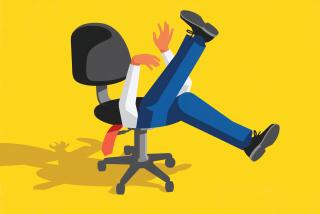Exercise Helps Those Who Have Lost Jobs Deal With Upset : Health: Keeping fit can aid in countering the physical and psychological ills that are caused by a loss of employment.
- Share via
NEW YORK — Regular exercise, be it walking as little as 30 minutes a day, can help counter the physical and psychological dangers that can accompany the news that you’ve just lost your job.
Physicians and therapists at a new outpatient program designed to help a “distressed population”--the unemployed--have learned that after losing a job there may be a marked deterioration of physical and psychological health.
Changes are especially evident in the heart and circulatory system, blood pressure and levels of depression.
“Changes in cardiovascular risk factors can be observed for at least two years following the loss of a job,” warns Herman Oliver, a psychiatrist with the Long Island Jewish Medical Center in New Hyde Park, N.Y.
His hospital has just set up a new outpatient therapy program designed to help unemployed people and their health problems.
For some individuals, he adds, “there is a marked impact on both the incidence and prevalence of severe depressive symptoms.
“The longer the period of unemployment, the more far-reaching the consequences,” including alcoholism and marital strife, Oliver points out.
Adds Steven Gecha, an osteopathic surgeon with Sports Medicine of Princeton, N.J.: “Getting laid off can be quite a shock to the individual’s system.
“Although men, in particular, are taught to ‘take it like a man’ and not show emotion, when they get fired, they’re angry and upset. And they can’t put off working through their feelings,” Gecha says. “They have got to confront them.”
Losing a job can be particularly painful, as many middle-aged managers have learned, “if they’ve let themselves get out of shape,” notes Samuel Osipow, a counseling psychologist at Ohio State University in Columbus.
“Some people’s former jobs inherently created an unhealthy situation” for them, he explains. “Their jobs may have involved exposure to excessive drinking after hours, and when they’re fired, they could slip into even heavier drinking.”
When the unemployed look in the mirror, says Osipow, they may discover “their clothes don’t fit. They don’t feel good about themselves, and when they’re interviewing (for a new job), they don’t project the impression they would like.”
It’s vital for them “to project a sense of well-being” just as they would need to project a sense of financial health if they were going to the bank for a loan, the psychologist contends.
Middle managers, he says, “are very vulnerable” and should be encouraged “to develop some kind of fitness program that involves participating with other people they can cross-network with and help their job search that way.”
The unemployed will benefit physically and mentally if they can say, “I’m going to spend 30 minutes exercising every morning,” Osipow says.
One problem with some fitness programs, such as joining a health club, he notes, “is that they require money, and people get worried about spending money when they’re out of work.”
But there is always walking, jogging and other inexpensive aerobic exercise. “Even if you don’t have a lot of money, you can buy a used bicycle and ride.”
After first checking with a physician, Osipow says, exercise newcomers can profit even from such simple things “as doing circles with your arms to loosen your joints, especially if you can do it with other people to get social support.”
Gecha points out that runners can “get a sense of real euphoria from jogging,” which can also combat pink-slip induced depression.
Jogging, he says, releases endorphins in the brain, a morphine-like substance responsible for producing a feel-good “runner’s high.”
Exercise will also help laid-off workers sleep better at night, when they might otherwise toss and turn dwelling on their misery, the sports medicine expert says.
For those who have slipped into poor health habits, Gecha continues, “dieting alone will not help them get into shape, but dieting and exercise will. They need to get into a regular exercise pattern and a regular sleep pattern.”


